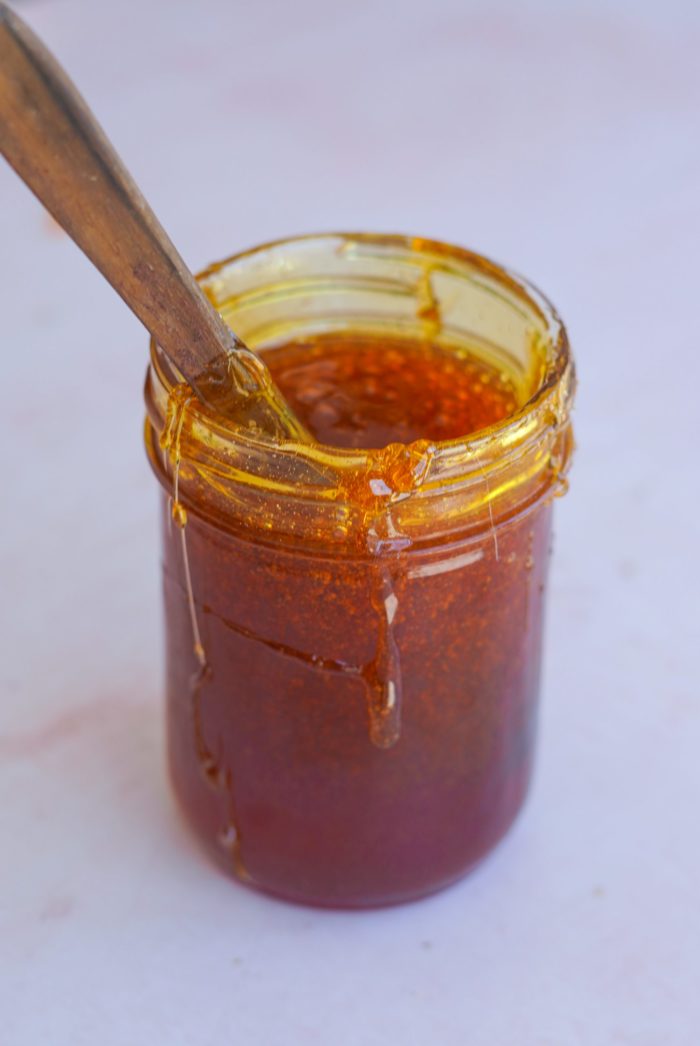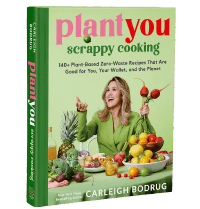Vegan Honey
In the plant-based community, the subject of honey is highly debated. Some consider honey fair game, while others argue that there is no such thing as vegan honey.

Is honey actually vegan?
By definition, veganism excludes animal products. This includes things produced by animals (such as eggs and dairy) as well as the animal itself (meat, leather, bone). In that sense, honey falls into the “animal product” category. After all, it is produced by honey bees, right?
Technically, that’s not entirely accurate. Bees collect nectar from the flowers, which is then processed and stored in the honeycomb cells. The processing involves adding a special enzyme that breaks down complex plant sugars into fructose and glucose. Then, bees eat and regurgitate the nectar several times to achieve the right consistency. The reason bees leave honey in cells is to reduce the moisture content. Over time, the water gradually evaporates, aided by the bees fanning their wings. So rather than being a product directly produced by bees, honey is merely a byproduct of their labor.
Bee that as it may (see what I did there?), the objections against honey go beyond its tentative label. Honey is a highly contentious subject in the plant-based community for a variety of reasons. People quote cruel treatment of honey bees, smoke manipulation, clipping of the queen’s wings, or replacing honey with sugar water. It is also common for beekeepers to use pesticides to kill mites and fungi, as well as treat their bees with antibiotics. Some products sold as honey are diluted with corn syrup or similar sweeteners. In a word, the ethics of honey production are questionable.

Food for thought
The simplest solution to avoid the internal ethical battle is to stop buying honey. However, we are currently seeing a worldwide decrease in the bee population, including wild bees and honey bees. The bees are integral to the functioning of our ecosystem. Roughly a third of our food crops are pollinated by bees. Without them, we would have very limited food supplies.
In countries with a shortage of bees, such as China, during the growing season workers manually pollinate plants with small brushes. This method is neither as efficient nor as effective as insect pollination. However, these measures are not in jest. They are necessary for the survival of our species, as well as other animals and the ecosystem as a whole.
The reasons for the bee population decrease are complex, but one way to combat or at least slow the process down is to create artificial bee colonies. While beekeepers profit from this arrangement, there is also an overall benefit to our planet. Furthermore, honey bees are not native to the North American continent, so buying honey is the best way to support the population of honey bees. However, you have the power to buy honey from reputable sources.
If you want to learn more, check out the episode of the PlantPod podcast where I interview one of the world’s leading bee experts, Mark Winston.

Naturally vegan honey alternatives
If you don’t have the budget or the opportunity to buy honey from an ethical supplier, or perhaps you are still on the fence, don’t worry! There are several plant-based alternatives to honey.
- Maple Syrup. I’m Canadian, so maple syrup practically runs through my veins. Jokes aside, for indigenous peoples across the North American continent, maple syrup has been a staple for hundreds of years. Maple syrup is made by extracting sap from certain types of maple, which is then simmered down to a thick liquid.
- Agave Nectar. This natural sweetener comes from the leaves of the blue agave plant. However, while it is unquestionably vegan, agave production comes with its own set of ethical questions.
- Molasses. Molasses is the byproduct of the sugarcane refining process. Although molasses is an acquired taste, many people like to use it as a vegan honey replacement in baking and cooking.
- Dandelion Vegan Honey. This mind-blowing honey replacement can be homemade with very few resources.
- Apple Juice Vegan Honey. Recipe below!

The Recipe: Dandelion Honey
Ingredients
- 4 cups Dandelions, the yellow bits
- 3 cups Water
- ½ Lemon, sliced
- Sugar, dependent on liquid left over
Instructions
- Rinse your dandelions in cold water.
- Place water, dandelions and lemon in a pot and bring to a boil. Simmer, uncovered, for 20 minutes.
- Turn off the heat and allow this to sit overnight.
- Strain out the flowers and lemon using a colander, reserving the liquid left behind.
- Measure the liquid left over, and place it in a pot with equal parts (weighted) white sugar. Bring to a boil, and simmer until desired consistency is achieved for approximately 25 minutes. If not thickening adjust sugar level as needed and continue to simmer.
- The liquid will firm up further once off of the burner, so take it off before it thickens too much.

The Recipe: Apple Juice Vegan Honey
Ingredients
- 4 cups apple juice, organic or freshly squeezed
- 1.5 cup white sugar
- 1 tbsp lemon juice
Equipment
- Small saucepan
- Jar
Instructions
- Add all ingredients into a small saucepan. Slowly heat it up to a simmer over low medium heat.
- Let it simmer, stirring regularly to make sure the sugar is fully dissolved. Allow the liquid to cook for 20-30 minutes. It should reduce by about a half. It's up to you to find the desired consistency, but be careful not to overcook, as the sugar may birn or caramelize.
- Carefully pour your apple juice vegan honey into the jar and let it cool down.


I just tried this and it’s AWESOME!! 😋
Got 3 little helpers to go find Mummy some “flowers” – they came back with a big bag! I have “honey” for days now! Yummmy! Thanks Carleigh! 🙌🏼
Can’t wait to make the Apple Juice version next…